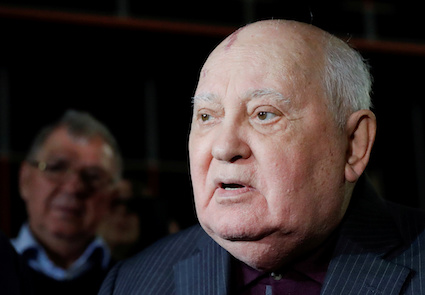US became ‘arrogant’ after fall of Soviet Union, says Gorbachev

(AFP) – Former Soviet leader Mikhail Gorbachev said today that Washington grew “arrogant and self-confident” after the collapse of the Soviet Union, leading to the expansion of the Nato military alliance.
In recent years President Vladimir Putin has grown increasingly insistent that Nato is encroaching close to Russia’s borders, and Moscow last week demanded “legal guarantees” that the US-led alliance will halt its eastward expansion.
“How can one count on equal relations with the United States and the West in such a position?” Gorbachev told state news agency RIA Novosti on the eve of the anniversary of his resignation as the leader of the USSR.
He noted the “triumphant mood in the West, especially in the United States” after the Soviet Union ceased to exist in 1991.
“They grew arrogant and self-confident. They declared victory in the Cold War,” Gorbachev, 90, said.
He insisted that it was “together” that Moscow and Washington pulled the world out of confrontation and the nuclear race.
“No, the ‘winners’ decided to build a new empire. Hence the idea of Nato expansion,” Gorbachev added.
However, he welcomed upcoming security talks between Moscow and Washington.
“I hope there will be a result,” he said.
Last week Moscow presented the West with sweeping security demands, saying Nato must not admit new members and seeking to bar the United States from establishing new bases in former Soviet countries.
Putin said yesterday that Washington has been willing to discuss the proposals and talks could happen at the start of next year in Geneva.
A senior US official said Washington was ready for talks “as soon as early January”.
Gorbachev resigned as president of the Soviet Union on December 25, 1991, days after the leaders of Belarus, Russia and Ukraine said the USSR no longer existed.
A former KGB agent and loyal servant of the Soviet Union, Putin was dismayed when it fell apart, once calling the collapse “the greatest geopolitical disaster of the 20th century”.

